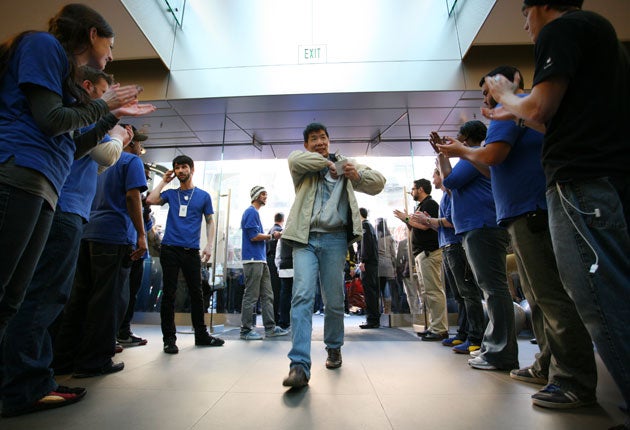Your support helps us to tell the story
From reproductive rights to climate change to Big Tech, The Independent is on the ground when the story is developing. Whether it's investigating the financials of Elon Musk's pro-Trump PAC or producing our latest documentary, 'The A Word', which shines a light on the American women fighting for reproductive rights, we know how important it is to parse out the facts from the messaging.
At such a critical moment in US history, we need reporters on the ground. Your donation allows us to keep sending journalists to speak to both sides of the story.
The Independent is trusted by Americans across the entire political spectrum. And unlike many other quality news outlets, we choose not to lock Americans out of our reporting and analysis with paywalls. We believe quality journalism should be available to everyone, paid for by those who can afford it.
Your support makes all the difference.What is genius worth? If you're the management of Apple, then the answer is simple: $14 an hour (£8.50). That's how much the computer giant pays hardworking staff at their American retail outlets, who are officially known as "geniuses" and who can often be found at an in-store facility known as "the genius bar".
According to at least one employee, that's not nearly enough, particularly since the spiralling public demand for iPods, iPads, iPhones, and other Jobsian devices recently helped the company to produce quarterly profits of almost $6bn. He says it's time for the "geniuses" to campaign for the salaries they deserve, by joining a trade union.
In a move that is sending ripples of concern through Silicon Valley, Cory Moll, a part-time staffer at Apple's San Francisco store, is attempting to form an organisation to fight for better wages, benefits and working conditions for the always cheerful staff who man the firm's fashionable retail outlets. Mr Moll began his campaign anonymously in May, by setting up a website for what he called the Apple Retail Workers Union. After receiving a smattering of emails from potential comrades, he decided to stick his head above the parapet at the weekend, granting an interview to Reuters about his putative workers' revolution.
"The core issues definitely involve compensation, pay, benefits," he said, adding that attempting to become the shop steward of a company valued at $320bn (£197bn) was a hefty challenge. "It's kind of a feeling of David versus Goliath," he said.
Mr Moll says that his salary does not represent a living wage in one of the world's most expensive cities. He earns only a few dollars more than the minimum wage, which in San Francisco is $9.92 an hour. The website of his organisation informs visitors: "At Apple, our most important resource, our soul, is our people. Our Time Has Come."
Apple has yet to respond to Mr Moll's campaign. However, it has in recent years faced several embarrassing PR setbacks with regard to its attitude towards workers' rights. In 2006 it was forced to carry out a review of labour conditions at the plant in China where its iPods are made, after it emerged that staff worked 60-hour, six-day weeks.
It found that demands on the 200,000 staff were "excessive". Its authors were "not satisfied" with conditions in dormitories where thousands of workers are forced to eat, sleep and spend large portions of their free time.
Last year, unwelcome attention once more focused on the site, after it emerged that at least ten employees had committed suicide by jumping off roofs. In response, the plant's Taiwanese owners ordered an immediate 30 per cent rise in wages, from their previous level of 900 yuan, or £90, a month.
Apple launched its retail outlets a decade ago and now has 325 stores around the world, with roughly 30,000 employees. In the UK there are 29 outlets, mostly in major city centres and larger out-of-town shopping malls.
The stores are designed to rely heavily on the competence of staff: there are no tills (employees carry credit card scanners) and customers are encouraged to interact with salespeople rather than browse shelves full of boxed goods. Almost all stock, with the exception of demo models, is kept in storerooms.
Given that business model, Mr Moll believes Apple's retail workforce is undervalued. However the declining influence of trade unions in the US – membership has dropped from around 20 per cent to nearer 10 per cent of the nation's workforce – suggests he may have his work cut out fomenting change.

Join our commenting forum
Join thought-provoking conversations, follow other Independent readers and see their replies
Comments